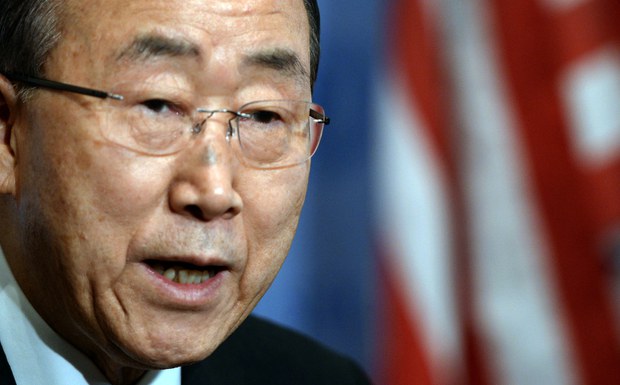North Korean H-Bomb Test Alarms Nations in South and Southeast Asia
2016.01.07
 United Nations Secretary General Ban Ki-moon condemns North Korea’s test of a nuclear device, Jan. 6, 2016.
United Nations Secretary General Ban Ki-moon condemns North Korea’s test of a nuclear device, Jan. 6, 2016.
Governments from South to Southeast Asia are voicing grave concern about this week’s announcement by North Korea that it successfully tested a hydrogen bomb.
Bangladesh, India, Indonesia, Malaysia, Thailand and Singapore joined an international chorus that either condemned North Korea’s latest reported nuclear weapons test or called on Pyongyang to restrain itself from testing more nuclear bombs.
“This (test) is in contravention to the U.N. Security Council Resolutions No. 1718, 1874, 2087 and 2094 and the non-proliferation regime,” the Bangladeshi Ministry of Foreign Affairs said Thursday in a statement expressing concern about the North Korean hydrogen bomb test, according to Bangladesh Sangbad Sangstha (BSS), the state-run news service.
The ministry called on North Korea to refrain from further activity that could “potentially escalate the situation.”
According to BSS, Dhaka had expressed similar alarm about earlier North Korean nuclear tests and missile launches, and had called those “unfavorable for maintenance of peace and stability in [the] Korean Peninsula and the world in general.”
In neighboring India, the Ministry of External Affairs described the test as “a matter of deep concern,” saying that the Democratic People’s Republic of North Korea (DPRK) had “again acted in violation of its international commitments. …”
“Our concerns about proliferation links between North East Asia and our neighborhood are well-known,” said the statement from India which, along with rival Pakistan, is one of two nations in South or Southeast Asia armed with nuclear weapons.
On Thursday, the Indian Express published a story headlined “North Korea nuclear test: A cancer that spread from Pakistan.”
The article claimed that North Korea agreed in 1996 to trade its long-range missile technology in exchange for Pakistan’s highly enriched uranium program. It also claimed that the architect of Pakistan’s nuclear program had sold uranium enrichment centrifuge designs to North Korea.
‘Profoundly destabilizing’
North Korea’s latest nuclear weapons test – the fourth one carried out by the isolated regime –took the world by surprise. Even China, its neighbor and major ally, reportedly had been left in the dark prior to the detonation.
Pyongyang claimed it successfully tested a hydrogen nuclear device for the first time – a more powerful bomb than those tested in 2006, 2009 and 2013.
North Korea’s official state-run KCNA News Agency called the weapon “the H-bomb of justice.”
“The successful H-bomb test was a measure for self-defense the DPRK took to protect its sovereignty and the vital rights of the Korean nation from the escalating nuclear threat and blackmail by the hostile forces, as part of its efforts to reliably defend the peace on the Korean Peninsula and regional security,” KCNA reported.
International seismology monitors recorded a 5.1-magnitude tremor next to North Korea’s Punggye-ri nuclear test site.
International experts, however, expressed skepticism about North Korea’s claim of testing a hydrogen bomb, pointing out that a chemical test would be necessary to verify it and that the tremor was not as strong as would be expected for a hydrogen bomb.
Nonetheless, the news of the test drew immediate condemnation from U.N. Secretary-General Ban Ki-moon and other world leaders.
“I demand the DPRK cease any further nuclear activities and meet its obligations for verifiable denuclearization,” Ki-moon said in a statement issued on Wednesday.
“This act is profoundly destabilizing for regional security and seriously undermines international non-proliferation efforts. I condemn it unequivocally,” he went on to say.
After North Korea’s first three nuclear tests, the U.N. Security Council condemned them and imposed economic and trade sanctions on the regime.
In response to the latest North Korean test, the council met on Wednesday and agreed to prepare a set of “further unspecified measures” against Pyongyang, Agence-France Presse reported Thursday.
‘Dangerous and provocative’
In Southeast Asia, statements from the governments of Singapore, Thailand, Indonesia and Malaysia all expressed alarm at Pyongyang’s latest nuclear move.
“This is a dangerous and provocative act with serious implications on the peace and stability of the region and the DPRK itself,” Singapore’s Ministry of Foreign Affairs said, adding that it intended to convey its concerns about the test to the North Korean ambassador.
Thailand called for the resumption of Six-Party Talks involving North Korea, China, Japan, Russia, South Korea and the United States in an effort to establish peace and stability in the Korean Peninsula.
For its part, Indonesia called on “all parties to respect and adhere to all related U.N. Security Council Resolutions, exercise self-restraint and place diplomacy and dialogue at the forefront in creating conditions conducive to peace, stability and development in the region.”
And Malaysia expressed similar concern, saying it “deeply regrets this latest incident which constitutes a grave threat to regional and global peace and security. It also undermines global efforts toward achieving the universal goal of complete and general disarmament.”







